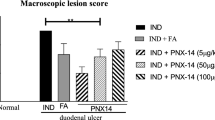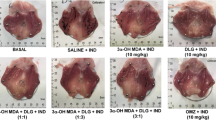Abstract
The effect of irsogladine maleate, a widely used antiulcer drug in Japan, on indomethacin-induced small intestinal lesions was examined in rats. Animals without fasting were given indomethacin (10 mg/kg, s.c.) and sacrificed 24 h later. Irsogladine (1–10 mg/kg) or 16,16-dimethyl prostaglandin E2 (dmPGE2 0.03 mg/kg) was given p.o. twice, 0.5 before and 6 h after indomethacin, while ampicillin (800 mg/kg) was given twice, 18 and 0.5 h before. Indomethacin caused severe lesions in the small intestine, mainly the jejunum and ileum, accompanied by intestinal hypermotility, the up-regulation of inducible nitric oxide synthase (iNOS) expression, and an increase of myeloperoxidase (MPO) activity as well as enterobacterial invasion in the mucosa. These events were all prevented by both dmPGE2 and ampicillin, except the intestinal hypermotility which was only prevented by dmPGE2. Likewise, irsogladine also significantly and dose-dependently prevented these lesions at >1 mg/kg. This agent alone increased mucus secretion and significantly suppressed the decreased mucus response to indomethacin, resulting in a suppression of the bacterial invasion as well as the increase in MPO activity and iNOS expression. The protective effect of irsogladine was mimicked by isobutylmethylxanthine, a nonselective inhibitor of phosphodiesterase (PDE), as well as rolipram, a selective PDE4 inhibitor. These results suggest that irsogladine protects the small intestine against indomethacin-induced lesions, and this effect may be associated with the increased mucus secretion, probably due to the inhibitory actions of PDE, resulting in suppression of enterobacterial invasion and iNOS expression.







Similar content being viewed by others
References
Whittle BJR (1981) Temporal relationship between cyclooxygenase inhibition, as measured by prostacyclin biosynthesis, and the gastrointestinal damage induced by indomethacin in the rat. Gastroenterology 80:94–98
Takeuchi K, Ueki S, Okabe S (1986) Importance of gastric motility in the pathogenesis of indomethacin-induced gastric lesions in rats. Dig Dis Sci 31:1114–1122
Konaka A, Nishijima M, Tanaka A, Kato S, Takeuchi K (1999) Nitric oxide, superoxide radicals and mast cells in pathogenesis of indomethacin-induced small intestinal lesions in rats. J Physiol Pharmacol 50:25–38
Takeuchi K, Miyazawa T, Tanaka A, Kato S, Kunikata T (2002) Pathogenic importance of intestinal hypermotility in NSAID-induced small intestinal damage in rats. Digestion 66:30–41
Takeuchi K, Yokota A, Tanaka A, Takahira Y (2006) Factors involved in upregulation of inducible nitric oxide synthase in rat small intestine following administration of nonsteroidal anti-inflammatory drugs. Dig Dis Sci 51:1250–1259
Yamada T, Deitch E, Specian RD, Perry MA, Sartor RB, Grisham MB (1993) Mechanism of acute and chronic intestinal inflammation induced by indomethacin. Inflammation 17:641–662
Whittle BJR, Laszlo F, Evans SM, Moncada S (1995) Induction of nitric oxide synthase and microvascular injury in the rat jejunum provoked by indomethacin. Br J Pharmacol 116:2286–2290
Wallace JL, McKnight W, Reuter BK, Vergnolle N (2000) NSAID-induced gastric damage in rats: requirement for inhibition of both cyclooxygenase 1 and 2. Gastroenterology 119:706–714
Tanaka A, Araki H, Hase S, Takeuchi K (2001) Inhibition of both COX-1 and COX-2 is required for development of gastric damage in response to nonsteroidal anti-inflammatory drugs. J Physiol Pari 95:21–27
Tanaka A, Hase S, Miyazawa T, Takeuchi K (2002) Up-regulation of COX-2 by inhibition of COX-1: a key to NSAID-induced intestinal damage. J Pharmacol Exp Ther 300:754–761
Kato S, Tanaka A, Kunikata T, Umeda M, Takeuchi K (2000) Protective effect of lafutidine against indomethacin-induced intestinal ulceration in rats: relation to capsaicin-sensitive sensory neurons. Digestion 61:39–46
Goldstein JL, Eisen GM, Lewis B, Gralnek IM, Zlotnick S, Fort JG (2005) Investigators. Video capsule endoscopy to prospectively assess small bowel injury with celecoxib, naproxen plus omeprazole, and placebo. Clin Gastroenterol Hepatol 3:133–141
Mashita Y, Taniguchi M, Yokota A, Tanaka A, Takeuchi K (2006) Oral but not parenteral aspirin upregulates COX-2 expression in rat stomachs: a relationship between COX-2 expression and PG deficiency. Digestion 73:124–132
Ueda F, Aratani S, Mimura K, Kimura K, Nomura A, Enomoto H (1984) Effect of 2,4-diamino-6-(2,5-dichlorophenyl)-s-triazine maleate (MN-1695) on gastric mucosal damage induced by various necrotizing agents in rats. Arzneim Forsch 34:478–484
Ueda F, Ban K, Ishima T (1995) Irsogladine activates gap-junctional intercellular communication through M1 muscarinic acetylcholine receptor. J Pharmacol Exp Ther 274:815–819
Kyoi T, Noda K, Oka M, Ukai Y (2004) Irsogladine, an anti-ulcer drug, suppresses superoxide production by inhibiting phosphodiesterase type 4 in human neutrophils. Life Sci 76:71–83
Yamasaki K, Kanbe T, Chijiwa T, Ishiyama H, Morita S (1987) Gastric mucosl protection by OPC-12759, a novel antiulcer compound in the rat. Eur J Pharmacol 142:23–29
Murakami M, Oketani K, Fujisaki H, Wakabayashi T, Ohgo T (1981) Antiulcer effect of geranylgeranylacetone, a new acyclic polyisoprenoid on experimentally induced gastric and duodenal ulcers in rats. Arzneimittelforschung 31:799–804
Deitch EA, Ma L, Ma WJ, Grisham MB, Granger DN, Specian RD, Berg RD (1989) Inhibition of endotoxin-induced bacterial translocation in mice. J Clin Invest 84:36–42
Castro GA, Roy SA, Srockstill RD (1974) Trichinella spioralis: peroxydase activity in isolated cells from the rat intestine. Exp Parasitol 36:307–315
Calignano A, Whittle BJR, Di Rosa M, Moncada S (1992) Involvement of endogenous nitric oxide in the regulation of rat intestinal motility in vivo. Eur J Pharmacol 229:273–276
Robert A, Asano T (1987) Resistance of germ-free rats to indomethacin-induced intestinal inflammation. Prostaglandins 14:333–341
Takeuchi K, Yokota A, Tanaka A (2006) Factors involved in upregulation of inducible nitric oxide synthase in rat small intestine following administration of nonsteroidal anti-inflammatory drugs. Dig Dis Sci 51:1250–1259
Boughton-Smith N, Evans SM, Laszlo F, Whittle BJR, Moncada S (1993) The induction of nitric oxide synthase and intestinal vascular permeability by endotoxin in the rat. Br J Pharmacol 110:1189–1195
Mizoguchi H, Miyazawa T, Ogawa Y, Tanaka A, Takeuchi K (2001) Protective effect of rebamipide on indomethacin-induced intestinal damage in rats. J Gastroenterol Hepatol 16:1112–1119
Yokota A, Ohno R, Takahira Y, Tanaka A, Takeuchi K (2005) Protective effect of teprenone against indomethacin-induced small intestinal lesions in rats. Jpn Pharmacol Ther 33:51–61
Kunikata T, Tanaka A, Miyazawa T, Kato S, Takeuchi K (2002) 16,16-Dimetyl prostaglandin E2 inhibits indomethacin-induced small intestinal lesions through EP3 and EP4 receptors. Dig Dis Sci 47:894–904
Takahashi S, Takeuchi K, Okabe S (1999) EP4 receptor mediation of prostaglandin E2-stimulated mucus secretion by rabbit gastric epithelial cells. Biochem Pharmacol 58:1997–2002
Coleman RA, Smith WL, Narumiya S (1994) Classification of prostanoid receptors: properties, distribution, and structure of the receptors and their subtypes. Pharmacol Rev 46:205–229
Terano A, Hiraishi H, Ota S, Sugimoto T (1986) Geranylgeranylacetone, a novel anti-ulcer drug, stimulates mucus synthesis and secretion in rat gastric cultured cells. Digestion 33:206–210
Ishihara K, Komuro Y, Nishiyama N, Yamasaki K, Hotta K (1992) Effect of rebamipide on mucus secretion by endogenous prostaglandin-independent mechanism in rat gastric mucosa. Arzneimittelforschung 42:1462–1466
Tanaka A, Hase S, Ohno R, Takeuchi K (2002) Roles of COX-1 and COX-2 inhibition in NSAID-induced intestinal damage in rats. J Pharmacol Exp Ther 303:1248–1254
Bertrand V, Guimbaud R, Tulliez M, Mauprivez C, Sogni P, Couturier D, Giroud JP, Chaussade S, Chauvelot-Moachon L (1998) Increase in tumor necrosis factor-a production linked to the toxicity of indomethacin for the rat small intestine. Br J Pharmacol 124:1385–1394
Griswoold DE, Webb EF, Badger AM, Gorycki PD, Levandoski PA, Bannette MA, Grous M, Christensen S, Torphy TJ (1998) SB 207499 (Ariflo), a second generation phsphodiestrase 4 inhibitor, reduces tumor necrosis factor a and interleukin-4 production in vivo. J Pharmacol Exp Ther 287:705–711
Atkins CM, Oliva AA, Alonso OF, Pearse DD, Bramlett HM, Dietrich WD (2007) Modulation of the cAMP signaling pathway after traumatic brain injury. Exp Neurol 208:145–158
Author information
Authors and Affiliations
Corresponding author
Rights and permissions
About this article
Cite this article
Kamei, K., Kubo, Y., Kato, N. et al. Prophylactic Effect of Irsogladine Maleate Against Indomethacin-Induced Small Intestinal Lesions in Rats. Dig Dis Sci 53, 2657–2666 (2008). https://doi.org/10.1007/s10620-008-0199-9
Received:
Accepted:
Published:
Issue Date:
DOI: https://doi.org/10.1007/s10620-008-0199-9




